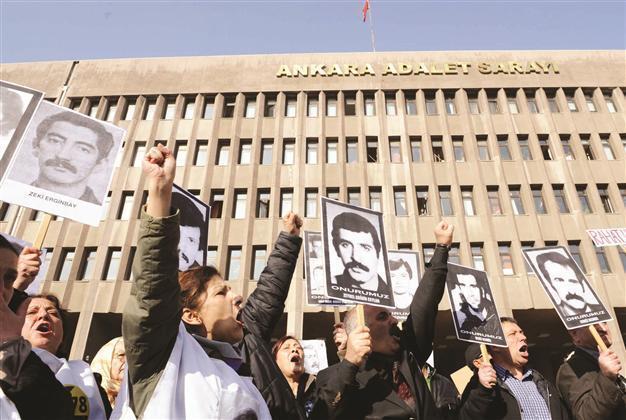Court rejects pleas to arrest coup defendants
ANKARA - Hürriyet Daily News

Protesters and families of the victims gather in front of the courthouse to mark the day. Nearly 500 people and institutions have requested intervening party status in the trial on the grounds of being victimized by the 1980 coup. Intervening parties included Turkey’s Parliament, Cabinet and government, eight political parties. DAILY NEWS photo, Selahattin SÖNMEZ
An Ankara court trying the two ailing defendants in the 1980 coup case has rejected pleas to arrest the pair, and decided to ask medical authorities if the defendants can answer questions via video conferencing or come to court with a medical escort.At the end of the third hearing yesterday, the judge decided not to arrest coup leader Kenan Evren, 94, and then-Air Force Commander Gen. Tahsin Şahinkaya, 86, both of whom are hospitalized, citing their advanced age and poor health, and said that putting a ban in place to prevent their traveling abroad would be sufficient.
The court decided to ask the military hospitals in Ankara and İstanbul where Evren and Şahinkaya are being treated whether their facilities are suitable for setting up video-conferencing equipment that would allow the defendants to answer questions in the upcoming hearings. The İstanbul Forensic Medicine Institute was also asked to provide a report on whether Evren and Şahinkaya could come to court under the care of their doctors.
The court said that criminal complaints would be filed against the pair on charges of torture and mistreatment, to be investigated separately. It accepted requests for intervening party status from the government, Parliament, the Republican People’s Party (CHP) and the Nationalist Movement Party (MHP). The case was adjourned until May 11.
In the hearing’s morning session, victims of the coup recounted grim stories of torture, as the Justice Ministry, National Intelligence Organization (MİT), Land Forces Command and Gendarmerie said in letters to the court that they had no documents or information about the massive campaign of torture that followed the September 12, 1980 putsch.
Accounts of torture
İsa Tekin, a witness from Diyarbakır, described cruel torture methods that were used on inmates in the notorious prison there in the wake of the coup. “We were subjected to the most horrifying methods of torture. Non-Muslim prisoners were circumcised, and fire extinguishers were inserted into prisoners’ anuses. These are only a few of the unimaginable methods the torturers used. There is adequate evidence to try them, and all of their collaborators should be tried as well.”
Another witness, İbrahim Tunç, said his brother died after a month of torture at a military garrison in İstanbul. There were cigarette burns, purple spots and the marks of electric shocks on his body, Tunç said.
Rahmi Yıldırım, a lieutenant at the time of the coup who was expelled from the army two years later due to his political convictions, stressed that the coup victimized not only civilians but also members of the military.
In Diyarbakır, meanwhile, the city’s chief prosecutor said his office has so far pinpointed 22 suspects after following up on hundreds of complaints of torture at the Diyarbakır prison following the coup.
















